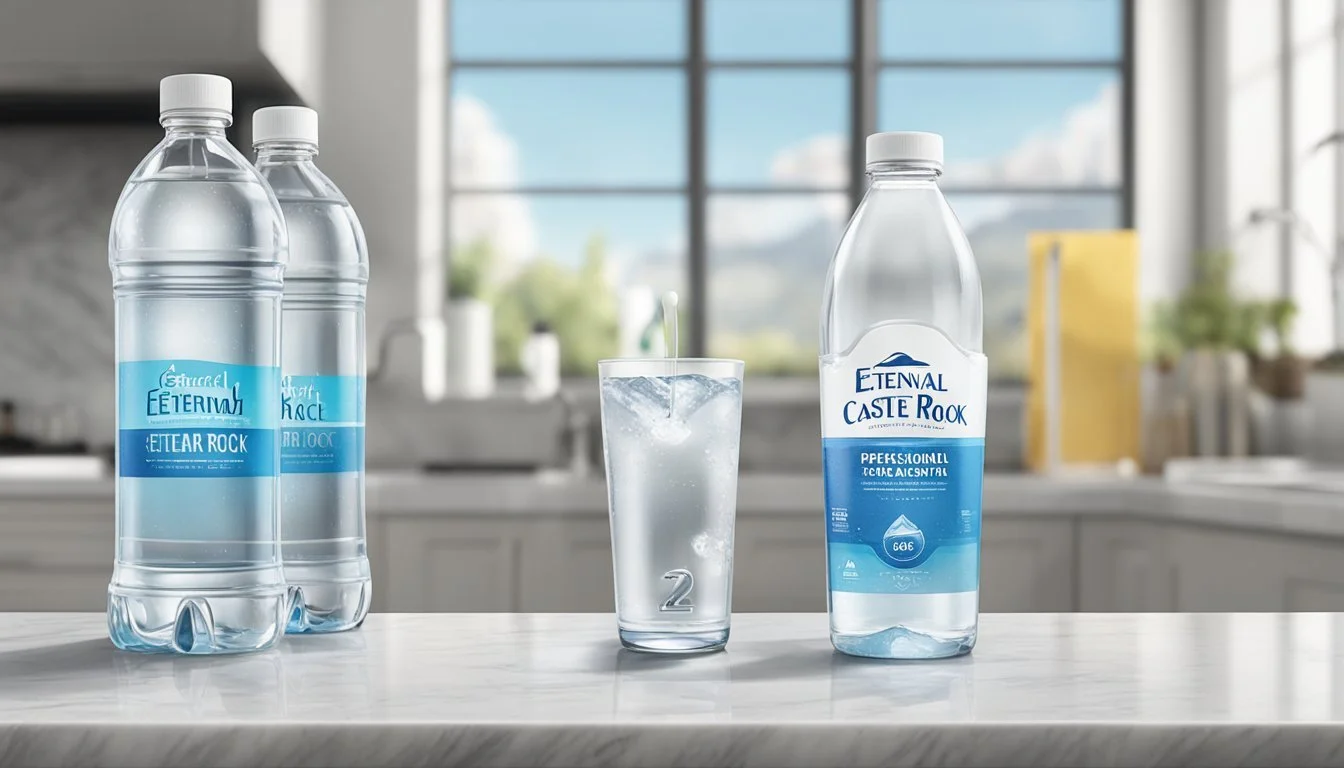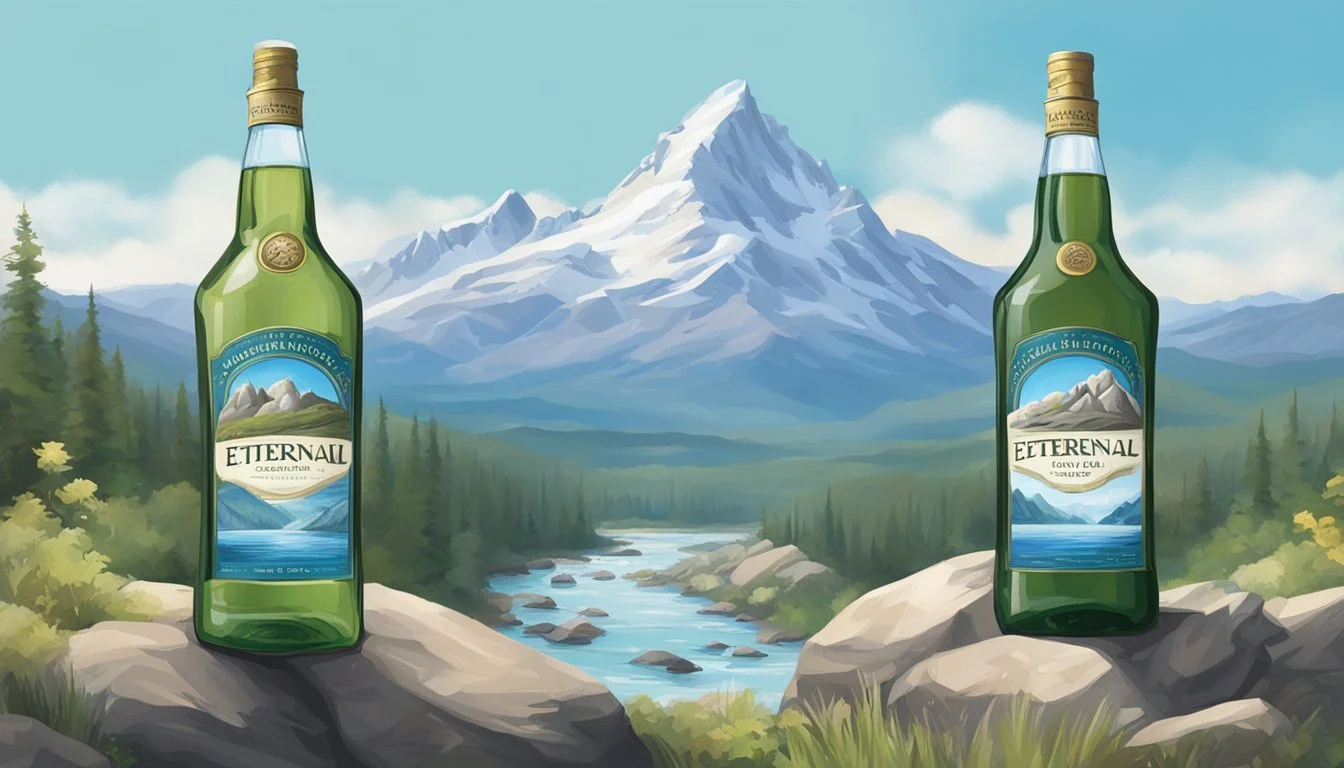Eternal vs. Castle Rock
Comparing the Best Bottled Water Brands
When it comes to choosing between Eternal and Castle Rock bottled waters, many consumers find themselves at a crossroads. Eternal, known for its naturally alkaline water sourced from protected underground springs, boasts a pH level of 7.8 to 8.2, providing a smooth and refreshing taste. Castle Rock, on the other hand, taps into pristine springs in the Mount Shasta region and prides itself on its organic certification and commitment to environmental sustainability.
For those prioritizing an eco-friendly option, Castle Rock may emerge as the preferable choice due to its environmentally conscious practices and high-quality, mineral-rich water. Eternal also offers a top-notch product aimed at hydration and wellness, with a higher pH and thorough filtration.
Understanding the benefits and distinctions of these brands can help consumers make an informed decision. With a focus on purity, taste, and environmental impact, both brands cater to different needs and preferences, making the choice ultimately dependent on personal priorities.
The Fundamentals of Bottled Water
Bottled water has evolved to cater to many health and hydration needs. Key factors to consider include sources, purification processes, and types of bottled water available.
Understanding Bottled Water
Bottled water is packaged for human consumption and can come from various sources, such as springs, wells, or even municipal supplies.
Companies often highlight the purity of their water by detailing their filtration methods. Common techniques include micro-filtration, reverse osmosis, and ultraviolet exposure. These methods remove impurities and contaminants, ensuring safe and clean water. Some brands further enhance their water by ionizing it or adding minerals to improve flavor and health benefits.
The pH level of bottled water can also vary, with alkaline water having a higher pH to neutralize acidity in the body. This diversity in options allows consumers to choose bottled water that best fits their health and taste preferences.
Types of Bottled Water
Spring Water: Obtained directly from natural sources, such as underground springs, and is often seen as a pure and clean option. It retains natural minerals and has undergone minimal processing.
Purified Water: Has undergone extensive filtration processes like reverse osmosis to remove contaminants and impurities. This type often includes added minerals to enhance flavor and nutritional value.
Alkaline Water: Characterized by a higher pH level, typically around 9.5 or higher, created by adding electrolytes or through ionization. It’s marketed for its potential to balance body acidity.
The distinctions among these types of bottled waters cater to different health needs and personal preferences, making it easier for consumers to select the right option for their lifestyle.
Assessing Water Quality and Purity
Eternal and Castle Rock bottled waters differ in various aspects, with particular attention to their pH levels and mineral content, which have direct implications for purity and health benefits.
Measuring pH Levels
The pH level of water ranges on a scale from 0 to 14, with 7 being neutral. Eternal water claims a naturally alkaline pH of 7.8 to 8.2, which is beneficial for neutralizing acidity in the body. High pH levels can also impart a smoother taste to the water.
Castle Rock, sourced from natural springs, maintains a slightly alkaline pH level of around 7.8. This level is similar to Eternal’s and helps balance bodily functions. Monitoring the pH level is crucial as it impacts both taste and potential health benefits. The FDA does not mandate bottled water pH levels, but maintaining a balanced pH is often cited by consumers for overall better hydration experiences.
Mineral Content and Health Benefits
Mineral content in bottled water includes essential elements like calcium, magnesium, and potassium, contributing to nutrient intake. Eternal water is known for its natural minerals, which can aid in bone health, muscle function, and cardiovascular health.
Castle Rock also boasts a rich mineral profile, enhancing the water’s taste and providing electrolytes essential for hydration, especially after physical activities. Purity in both brands is maintained by stringent safety standards to avoid contaminants. Both companies undergo regular testing to ensure compliance with FDA safety regulations, providing reassurance of quality.
Understanding mineral content is essential for consumers seeking the health benefits of their bottled water choices without compromising on purity or safety.
Comparing Eternal and Castle Rock
Eternal and Castle Rock are both known for offering high-quality bottled water, but they have differences in their sourcing, purification processes, and taste profiles. This section will cover these aspects in detail.
Sourcing and Origin
Eternal sources its water from natural springs located in the Appalachian Mountains. These springs are known for their pristine and clean environment, which adds to the water's purity.
Castle Rock also boasts its source from natural springs, specifically the Mount Shasta region in California. The water from this area is renowned for its high-quality and purity due to the volcanic rock filtration provided by the mountain.
Both brands emphasize the natural origins of their water, appealing to consumers who prefer naturally sourced products. The unique geographical locations of each brand's source contribute significantly to their distinct compositions and qualities.
Extraction and Purification Processes
Eternal focuses on an extensive purification process that involves multiple stages of filtration to remove impurities while retaining essential minerals. The brand uses techniques like micro-filtration and UV exposure to ensure the water's purity and safety.
Castle Rock also uses a comprehensive purification process. Their method includes reverse osmosis and carbon filtration to achieve high levels of purity. Additionally, Castle Rock emphasizes sustainability in its extraction processes, ensuring minimal environmental impact.
Both brands prioritize the purity of their water, employing advanced technologies to filter out contaminants effectively. The methods they use underscore their commitment to providing clean, safe drinking water.
Taste Profile Analysis
Eternal water is often described as having a clean, crisp taste with a slight mineral undertone. The taste is light, making it refreshing and easy to drink. The natural minerals retained during the purification process contribute subtly to its flavor profile.
Castle Rock water, on the other hand, has a more pronounced mineral taste due to the volcanic rock filtration. This gives it a slightly earthy undertone, which some consumers find distinctive and appealing. The taste is robust, reflecting the rich mineral composition from the Mount Shasta springs.
Each brand offers a unique tasting experience, shaped by their natural sources and purification processes. Eternal's light and crisp taste contrasts with Castle Rock’s robust and earthy flavor, catering to different consumer preferences.
Environmental Considerations
Environmental concerns are vital when comparing Eternal and Castle Rock bottled water. This section examines their sustainability efforts, packaging choices, and company ethics and practices.
Sustainability Efforts
Eternal and Castle Rock prioritize sustainability in various ways. Eternal Water emphasizes sourcing from protected underground springs, ensuring minimal environmental impact.
Castle Rock Water goes further by operating on 100% renewable energy and achieving carbon-neutral status. Both brands engage in water conservation initiatives, but Castle Rock's renewable energy use sets a higher sustainability standard.
Packaging Choices
Packaging choices significantly impact the environment. Eternal Water uses PET plastic bottles, which are recyclable but contribute to plastic waste if not properly managed.
On the other hand, Castle Rock Water offers more eco-friendly options, such as glass bottles and boxed water. These materials reduce plastic waste and often have a smaller carbon footprint. Choosing Castle Rock may align better with eco-conscious consumers.
Company Ethics and Practices
Evaluating company ethics and practices reveals more about their environmental commitment. Eternal Water advocates for eco-friendly practices but has yet to be completely transparent about its overall operations.
Castle Rock Water stands out with its transparent business model and strong environmental policies. They support various eco-initiatives and maintain high ethical standards. Their commitment to environmental stewardship is evident in their practices and policies.
Consumer Experience
Consumer experience with Eternal and Castle Rock bottled water varies based on their availability, accessibility, and brand trust.
Availability and Accessibility
Eternal water is widely available in various grocery stores and online platforms. Its convenient 600 ml size makes it easy to carry, fitting well into daily routines. Users appreciate the consistent presence of this brand, enhancing the ease of access.
Castle Rock, on the other hand, may not be as readily available in all regions. It can often be found in specialty and health food stores, which might limit its accessibility compared to Eternal. This difference in presence can influence consumer preference based on the ease of purchase.
Brand Trust and Reputation
Eternal enjoys a robust reputation among bottled water brands. It is known for its high pH and purity, frequently mentioned for its taste and hydration benefits. Feedback often highlights its reliability and consumer satisfaction.
Castle Rock also holds a respectable position in the market. Its reputation is built on sustainability practices and high-quality sourcing. Consumers who prioritize environmental factors and natural mineral content often favor Castle Rock.
Both brands are trusted by their consumers; however, the specific attributes they are praised for may attract different markets.
Expert Perspectives
Experts have varying insights into the qualities of Eternal and Castle Rock bottled water, focusing on elements such as taste, health benefits, and overall hydration impact.
Water Sommelier Insights
Water sommeliers emphasize the nuanced tastes and mineral content present in both Eternal and Castle Rock waters. Eternal water has a balanced mineral profile that many find smooth and refreshing. It is often praised for its consistency and energy-boosting properties.
Castle Rock water stands out for its slightly higher mineral content. This gives it a richer taste that appeals to those seeking a more robust hydration experience. Provenance also matters: sourced from pristine springs, Castle Rock is perceived as a premium option.
Health Professional Opinions
Health professionals often look at factors such as pH levels and the presence of essential minerals. Eternal water, with a pH of around 7.8, and Castle Rock water, with a slightly alkaline pH, are both good choices for maintaining life's natural balance.
Eternal water's focus on purity and electrolyte infusion is highlighted as beneficial for daily hydration. Meanwhile, Castle Rock's natural filtration process through volcanic rocks enriches it with minerals, making it a favored option for health-conscious individuals seeking added nutritional benefits.
Market Overview
Eternal and Castle Rock both stake their claim in the competitive bottled water market by emphasizing purity and unique sourcing. Assessing these brands requires a comparative look at how they measure up to industry leaders and their price points.
Comparative Analysis with Other Brands
Eternal Water is noted for its unique sourcing from protected underground springs in the United States, which contributes to its naturally alkaline state. Castle Rock, sourced from the pristine springs of Mount Shasta, also prides itself on purity and naturally balanced minerals.
In the bottled water arena, prominent players like Evian and Fiji Water are renowned for their mountain and artesian origins. Brands such as Voss and Icelandic Glacial also offer high-end options, often marketed for their distinctive taste and packaging.
Eternal and Castle Rock's focus on natural alkalinity gives them a niche appeal, standing out from brands like Dasani and Aquafina, which use processed municipal sources. Similarly, Smartwater differentiates itself with added electrolytes, echoing aspects of Eternal’s enrichment processes.
Price Point Considerations
When evaluating bottled water, cost is a significant factor. Eternal Water, offered in modestly sized bottles, tends to position itself in the mid-to-premium price range. This aligns with the pricing strategies of Fiji and Voss, which target consumers willing to pay for perceived higher quality.
Castle Rock, similarly positioned in the premium segment, often appears alongside competitors like Evian and Flow. These brands justify their pricing through their commitment to sustainability and superior mineral content.
Budget brands like Nestlé Pure Life and Polar Spring cater to consumers seeking value over exclusivity. They contrast starkly with niche brands such as Mountain Valley and Acqua Panna, which emphasize heritage and purity over affordability.
Both Eternal and Castle Rock must balance their premium aspirations with competitive pricing to maintain consumer interest amid a crowded market landscape.
More About Eternal
Eternal vs Icelandic Glacial: Which Bottled Water is Better?
Eternal vs Kirkland Signature: Which Bottled Water is Better?
Eternal vs Mountain Valley Spring Water: Which Bottled Water is Better?
Eternal vs Richard's Rainwater: Which Bottled Water is Better?
Eternal vs Whole Foods Italian Still Mineral water: Which Bottled Water is Better?
More About Castle Rock
Aqua Carpatica vs Castle Rock: Which Bottled Water is Better?
Castle Rock vs Cascade Mountain: Which Bottled Water is Better?
Castle Rock vs Crystal Geyser: Which Bottled Water is Better?
Castle Rock vs Hawaii Volcanic: Which Bottled Water is Better?
Castle Rock vs Hawaiian Springs: Which Bottled Water is Better?
Castle Rock vs Kirkland Signature: Which Bottled Water is Better?
Castle Rock vs Purely Sedona: Which Bottled Water is Better?
Castle Rock vs Richard's Rainwater: Which Bottled Water is Better?
Castle Rock vs Solan de Cabras: Which Bottled Water is Better?
Castle Rock vs Talking Rain AQA: Which Bottled Water is Better?
Castle Rock vs Whole Foods 365: Which Bottled Water is Better?
Castle Rock vs Whole Foods Italian Still Mineral water: Which Bottled Water is Better?
Core Hydration vs Castle Rock: Which Bottled Water is Better?
Icelandic Glacial vs Castle Rock: Which Bottled Water is Better?
Mountain Valley Spring Water vs Castle Rock: Which Bottled Water is Better?
Nestle Pure Life vs Castle Rock: Which Bottled Water is Better?
Poland Spring vs Castle Rock: Which Bottled Water is Better?
San Pellegrino vs Castle Rock: Which Bottled Water is Better?









